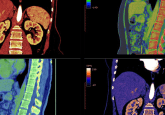Deep learning in pharmacogenomics: from gene regulation to patient stratification

Pharmacogenomics, our partnered journal, has recently published a Perspective exploring deep learning within pharmacogenomics. Machine learning models can enable the discovery of key genetic variants and markers, while also allowing more efficient data mining.
Abstract
This Perspective provides examples of current and future applications of deep learning in pharmacogenomics, including: identification of novel regulatory variants located in noncoding domains of the genome and their function as applied to pharmacoepigenomics; patient stratification from medical records; and the mechanistic prediction of drug response, targets and their interactions. Deep learning encapsulates a family of machine learning algorithms that has transformed many important subfields of artificial intelligence over the last decade, and has demonstrated breakthrough performance improvements on a wide range of tasks in biomedicine. We anticipate that in the future, deep learning will be widely used to predict personalized drug response and optimize medication selection and dosing, using knowledge extracted from large and complex molecular, epidemiological, clinical and demographic datasets.





